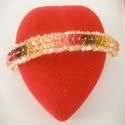 CWN.org - KAUSWAGAN, Philippines
In the southern Philippines, the military is fighting a group of Muslim rebels.
The Moro Islamic Liberation Front wants parts of the island of Mindanao declared a Muslim enclave.
In the midst of the violence, a Muslim village that used to be a haven for the rebels is now sowing peace.
Before the year 2000, no christian could enter Delabayan.
Now, Christians and Muslims shake hands in the name of peace in the village that used to be a haven for the Moro Islamic Liberation Front.
The Muslim residents hated all Christians, especially after soldiers burned down their houses in an all out war against the MILF. Read more
CWN.org - KAUSWAGAN, Philippines
In the southern Philippines, the military is fighting a group of Muslim rebels.
The Moro Islamic Liberation Front wants parts of the island of Mindanao declared a Muslim enclave.
In the midst of the violence, a Muslim village that used to be a haven for the rebels is now sowing peace.
Before the year 2000, no christian could enter Delabayan.
Now, Christians and Muslims shake hands in the name of peace in the village that used to be a haven for the Moro Islamic Liberation Front.
The Muslim residents hated all Christians, especially after soldiers burned down their houses in an all out war against the MILF. Read more
Young students like Jasmin Moner had to stop going to school when their families were displaced.
"I saw soldiers fire their guns. Pregnant women give birth and did not have food, no water," she remembered. "What was worse is that even if we were not the enemy, Christians looked down on us. They turned away from me."
Good Arises Out of Bad
But something good came out of this for the residents of Delabayan. The Christian organization, Project I.S.L.A.M., acronym for I Sincerely Love All Muslims, helped the Muslim villagers rebuild their houses and their lives.
Pastor Lad is Project I.S.L.A.M.'s dedicated worker in Delabayan.
"Our desire is to help the Muslims, to reach out to them in love and by doing so bring reconciliation between the Christians and the Muslims," he said.
War Draws Delabayan's People Closer
A few months ago, nearby villages were being evacuated because of heavy fighting between the military and MILF rebels in their area.
That's when a special bond between the Christians and the Muslims.
"We valued our Christian brothers coming here in the tension brought about by the atrocities by the MILF telling me the Christian community are praying for us," Sultan Kamlon Moner said. "Also, the Muslims here were praying for our Christian brothers."
Moner strongly believes that their children should be educated. This is why he is very grateful for the free college education that the youth in receive through Project I.S.L.A.M.
Learning to Love
His daughter, Jasmin was one of its scholars and is now working as a social worker in a Christian school.
"This is now my passion to help the people who helped me," Jasmin said. "I realized that if Christian people can help Muslims then why can't Muslims help the Christians. I also want to show Christian children that Muslims can be their friends."
Because of Jasmine's success, her brother Margani who was a MILF rebel for several years, decided to leave the renegade group and join mainstream society. He is now a scholar of Project I.S.L.A.M-- a sophomore taking up criminology.
"It was in a youth camp of Project I.S.L.A.M. that I learned to forgive my Christian brothers," Margani said. "I chose this course because I want to help maintain the peace and order in our community."
Through the years of sporadic fighting between Muslim rebels and Christian soldiers, the village has significantly been spared.
And Project I.S.L.A.M. is a sign of hope that people, regardless of culture and religion, still long for peace.
THIS IS A GOOD NEWS FOR US ALL CHRISTIANS...
source: CBN-700 CLUB






















































1 comment:
what is the status of Christ in Islam ?
In the Name of Allah, the Merciful, the Compassionate
——————————————————————————–
Chapter One : Christian Muslim Responses
——————————————————————————–
Debate on TV
At the end of the debate - "Christianity and Islam" - which appeared on the SABC-TV program "Cross Questions" on Sunday 5th June 1983, the Chairman, Mr. Bill Chalmers commented: "I think it can be said from this discussion that there is, at present, somewhat more accommodation on the Islamic side for the founder of Christianity than there is on the Christian side for the founder of Islam. What the significance of that is, we leave it to you, the viewer, to determine, but I do think you will agree that it is a good thing that we are talking together."
"Bill" as he is popularly addressed, without any formalities, on all his programs, by all his panelists, is extremely charming and stupendous in his humility. He is a picture of what the Holy Quran portrays of a good Christian:
"…And nearest among them in love to the believers wilt thou find those who say: 'We are Christians': because among these are men devoted to learning and men who have renounced the world. And they are not arrogant." (The Holy Quran 5:82)
Jesus - His Status
Were the Muslims on the panel trying to placate the viewers out policy, deceit or diplomacy? Nothing of the kind! They were only articulating what God Almighty had commanded them to say in the Holy Quran. As Muslims, they had no choice. They had said in so many words: "We Muslims believe, that Jesus was one of the mightiest messengers of God that he was the Christ, that he was born miraculously without any male intervention (which many modern-day Christians do not believe today), that he gave life to the dead by God's permission and that he healed those born blind and the lepers by god's permission. In fact, no Muslim is a Muslim if he or she does not believe in Jesus!"
Pleasant Surprise
Over 90% of the people who witnessed this debate must have been pleasantly, but skeptically, surprised. They might have not believed their ears. They must have surmised that the Muslims were playing to the gallery - that they were trying to curry favor with their fellow Christian countrymen; that if the Muslims would say a few good words about Jesus, then in reciprocation the Christians might say a few good words about Muhammed (may the peace and the blessings of God be upon all His righteous servants, Moses, Jesus, Muhammed…etc.); that I scratch your back and you scratch my back - which would be a sham or hypocrisy.
Hate Cultivated
We cannot blame the Christians for their skepticism. They have been so learned for centuries. They were trained to think the worst of the man Muhammed, salla Allah u alihi wa sallam, and his religion. How aptly did Thomas Carlyle say about his Christian brethren over a hundred and fifty years ago: "The lies which well-meaning zeal has heaped round this man (Muhammed) are disgraceful to ourselves only." We Muslims are partly responsible for this. We have not done anything substantial to remove the cobwebs.
Ocean of Christianity
South Africa is an ocean of Christianity. If Libya boasts the highest percentage of Muslims on the continent of Africa, then the Republic of South Africa would also be entitled to boast the highest percentage of Christians. In this ocean of Christianity the R.S.A. - the Muslims are barely 2% of the total population. We are a voteless minority - numerically, we count for nothing; politically, we count for nothing; and economically, one white man, as Oppenheimer, could buy out the whole lot of us, lock, stock and barrel.
So if we had feigned to appease, we might be excused. But no! We must proclaim our Master's Will; we must declare the Truth, whether we liked it or not. In the words of Jesus: "Seek ye the truth, and the truth shall set you free" (John 8:32).
——————————————————————————–
Chapter Two : Jesus in the Quran
——————————————————————————–
Christians Unaware
The Christian does not know that the true spirit of charity which the Muslim displays, always, towards Jesus and his mother Mary spring from the fountainhead of his faith - the Holy Quran. He does not know that the Muslim does not take the holy name of Jesus, in his own language, without saying Eesa, alaihi assalam ("Jesus, peace be upon him")
The Christian does not know that in the Holy Quran Jesus is mentioned twenty five times. For example:
"We gave Jesus, the son of Mary, clear signs and strengthened him with the Holy Spirit" (The Holy Quran 2:87)
"O Mary! God giveth thee glad tidings of a Word from Him: his name will be Christ Jesus, the son of Mary…" (3:45)
"…Christ Jesus the son of Mary was (no more than) an apostle of god…" (4:171)
"…And in their foot steps we sent Jesus the son of Mary…" (5:46)
"And Zakariya and John, and Jesus and Elias: all in the ranks of the righteous." (6:85)
Jesus - His Titles
Though Jesus is mentioned by name in twenty-five places in the Holy Quran, he is also addressed with respect as: Ibn Maryam, meaning "The son of Mary"; and as the Maseeh (in Hebrew it is the Messiah), which is translated as "Christ". He is also known as Abdullah, "The servant of Allah"; and as Rasul u Allah, the messenger of Allah.
He is spoken of as "The Word of God", as "The Spirit of God", as a "Sign of God", and numerous other epithets of honor spread over fifteen different chapters. The Holy Quran honors this mighty messenger of God, and the Muslims have not fallen short over the past fourteen hundred years in doing the same. There is not a single disparaging remark in the entire Quran to which even the most jaundiced among the Christians can take exception.
Eesa Latinised to "Jesus"
The Holy Quran refers to Jesus as Eesa, and this name is used more times than any other title, because this was his "Christian" name. Actually, his proper name was Eesa (Arabic), or Esau (Hebrew); classical Yeheshua, which the Christian nations of the West latinised as Jesus. Neither the "J" nor the second "s" in the name Jesus is to be found in the original tongue - they are not found in the Semitic languages.
The word is very simply "E S A U" a very common Jewish name, used more than sixty times in the very first booklet alone of the Bible, in the part called "Genesis". There was at least one "Jesus" sitting on the "bench" at the trial of Jesus before the Sanhedrin. Josephus the Jewish historian mentions some twenty five Jesus' in his "Book of Antiquities". The New Testament speaks of "Bar-Jesus" a magician and a sorcerer, a false prophet (Acts 13:6); and also "Jesus-Justus" a Christian missionary, a contemporary of Paul (Colossians 4:11). These are distinct from Jesus the son of Mary. Transforming "Esau" to (J)esu(s) - Jesus - makes it unique. This unique (?) name has gone out of currency among the Jews and the Christians from the 2nd century after Christ. Among the Jews, because it came to be a name of ill - repute, the name of one who blasphemed in Jewry; and among the Christians because it came to be the proper name of their God. The Muslim will not hesitate to name his son Eesa because it is an honored name, the name of a righteous servant of the Lord.
——————————————————————————–
Chapter Three : Mother And Son
——————————————————————————–
Mary Honored
The birth of Jesus Christ is described in two places of the Quran - chapter 3 and chapter 19. Reading from the beginning of his birth, we come across the story of Mary, and the esteemed position which she occupies in the House of Islam, before the actual annunciation of the birth of Jesus is given:
"'Behold'! the angels said: 'O Mary! God hath chosen thee and purified thee, and chosen thee above the women of all nations" (3:42)
"Chosen thee above the women of all nations." Such an honor is not to be found given to Mary even in the Christian Bible! The verse continues:
"O Mary! Worship thy Lord devoutly: prostrate thyself, and bow down (in prayer) with those who bow down." (3:43)
Divine Revelation
What is the source of this beautiful and sublime recitation which, in its original Arabic, moves men to ecstasy and tears? verse 44 below explains:
"This is part of the tidings, of the things unseen, which We reveal unto thee (O Muhammad!) by inspiration: Thou wast not with them when they cast lots with arrows, as to which of them should be charged with the care of Mary: nor wast thou with them when they disputed (the point)." (3:44)
Mary's Birth
The story is that the maternal grandmother of Jesus, Hannah, had hitherto been barren. She poured out her heart to God: If only God will grant her a child, she would surely dedicate such a child for the service of God in the temple.
God granted her prayer and Mary was born. Hannah was disappointed. She was yearning for a son, but instead she delivered a daughter; and in no way is the female like the male, for what she had in mind. What was she to do? She had made a vow to God. She waited for Mary to be big enough to fend for herself.
When the time came, Hannah took her darling daughter to the temple, to hand over for temple services. Every priest wanted to be the god-father of this child. They cast lots with arrows for her - like the tossing of the coin - head or tail?
eventually she fell to the lot of Zakariya, but not without a dispute.
The Source of His Message
This was the story. But where did Muhammed, salla Allah u alihi wa sallam, get this knowledge from? He was an Ummi, Arabic for "unlettered". He did not low how to read or write. He is made by God Almighty to answer this very question in the verse above, by saying that it was all by divine inspiration. "No!", says the controversialist. "This is Muhammed's own concoction. He copied his revelations from the Jews and Christians. He plagiarized it. He forged it."
Knowing full-well, and believing as we do, that the whole Quran is the veritable Word of God, we will nevertheless agree, for the sake of argument, with the enemies of Muhammed, salla Allah u alihi wa sallam, for a moment, that he wrote it. We can now expect some cooperation from the unbelievers.
Ask him: "Have you any qualms in agreeing that Muhammed was an Arab?" Only an ignorant will hesitate to agree. In that case there is no sense in pursuing any discussion. Cut short the talk. Close the book!
With the man of reason, we proceed. "That this Arab, in the first instance, was addressing other Arabs. He was not talking to Indian Muslims, Chinese Muslims, or Nigerian Muslims. He was addressing his own people, the Arabs. Whether they agreed with him or not, he told them in the most sublime form, words that were seared into the hearts and minds of his listeners that Mary the mother of Jesus, a Jewess, was chosen above the women of all nations. Not his own mother, nor his wife nor his daughter, nor any other Arab woman, but a Jewess! Can one explain this? Because to everyone his own mother or wife, or daughters would come before other women.
Why would the prophet of Islam honor a woman from his opposition! and a Jewess at that! belonging to a race which had been looking down upon his people for three thousand years? Just as they still look down upon their Arab brethren today."
Sarah and Hagar
The Jews learn, from the Bible, that their father, Abraham, had two wives Sarah and Hagar. They say that they are the children of Abraham through Sarah his legitimate wife; that their Arab brethren have descended through Hagar, a "bondwoman", and that as such, the Arabs are an inferior breed.
Will anyone please explain the anomaly as to why Muhammed, salla Allah u alihi wa sallam, if he is the author, chose this Jewess for such high honor? The answer is simple, he had no choice he had no right to speak of his own desire. "It is no less than an inspiration sent down to him." (53:4)
The Chapter of Maryam
There is a Chapter in the Holy Quran, named Surat u Maryam "Chapter Mary", named in honor of Mary the mother of Jesus Christ, peace and blessings of Allah be upon him; again, such an honor is not to be found given to Mary in the Christian Bible. Out of the 66 books of the Protestants and 73 of the Roman Catholics, not one is named after Mary or her son. You will find books named after Matthew, Mark, Luke, John, Peter, Paul and two score more obscure names, but not a single one is that of Mary!
If Muhammed, salla Allah u alihi wa sallam, was the author of the Holy Quran, then he would not have failed to include in it with Mary, the mother of Jesus, his own mother Aamina, his dear wife Khadija, or his beloved daughter Fatima. But No! No! This can never be. The Quran is not his handiwork!.
——————————————————————————–
Chapter Four : The Good News
——————————————————————————–
" 'Behold!' the angels said: 'O Mary! Allah giveth thee glad tidings of a word from him: his name will be Jesus, the son of Mary; held in honor in this world and the hereafter; and (of the company of) those nearest to Allah." (3:45)
"Nearest to God," not physically nor geographically, but spiritually. Compare this with "And (Jesus) sat on the right hand of God." (Mark 16:19). The bulk of Christendom has misunderstood this verse as well as many others in the Bible. They imagine the Father (God) sitting on a throne, a glorified chair, and His Son, Jesus, sitting on His right hand side. Can you conjure up the picture? If you do, you have strayed from the true knowledge of God. He is no old Father Christmas. He is beyond the imagination of the mind of man. He exists. He is real, but He is not like anything we can think of, or imagine.
In eastern languages "right hand" meant a place of honor, which the Holy Quran more fittingly describes as "In the company of those nearest to Allah." The above verse confirms that Jesus is the Christ. and that he is the Word which God bestowed upon Mary. Again, the Christian reads into these words, a meaning which they do not carry. They equate the word "Christ" with the idea of a god-incarnate; and the "Word" of God to be God.
"Christ" Not a Name
The word "Christ" is derived from the Hebrew word Messiah, Arabic Maseeh. Root word masaha, meaning "to rub", "to massage", "to anoint". Priests and kings were anointed when being consecrated to their offices. But in its translated Grecian form, "Christ" seems unique: befitting Jesus only.
Christians like to translate names into their own language; like Cephas to "Peter" , Messiah to "Christ". How do they do that? Very easily. Messiah in Hebrew means "Anointed". The Greek word for anointed is Christos. Just lop off the 'os' from Christos, and you are left with "Christ"; a unique name!
Christos means "Anointed", and anointed means appointed in its religious connotation. Jesus, peace and blessing be upon him, was appointed (anointed) at his baptism by John the Baptist, as God's Messenger. Every prophet of God is so anointed or appointed. The Holy Bible is replete with the "anointed" ones. In the original Hebrew, he was made a Messiah. Let us keep to the English translation "anointed."
Not only were prophets and priests and kings anointed (Christos-ed), but horns, and cherubs and lamp-posts also.
"I am the God of Bethel, where you anointed a pillar …" (Genesis 31:13)
"If the priest that is anointed do sin …" (Leviticus 4:3)
"And Moses… anointed the tabernacle and all things that was therein…" (Leviticus 8:100)
"..the Lord shall…exalt the horn of his anointed" (I Samuel 2:10)
"Thus saith the Lord to his anointed to Cyrus…" (Isaiah 45:1)
"Thou art the anointed cherub…" (Ezekiel 28:14)
There are an hundred more such references in the Holy Bible. Every time you come across the word "anointed" in your Bible, you can take it that that word would be christos in the Greek translations, and if you take the same liberty with the word that the Christians have done, you will have Christ Cherub, Christ Cyrus, Christ Priest and Christ Pillar, …etc.
Some Titles Exclusive
Although, every prophet of God is an anointed one of God, a Messiah, the title Maseeh or Messiah, or its translation "Christ" is exclusively reserved for Jesus, the son of Mary, in both Islam and in Christianity. This is not unusual in religion. There are certain other honorific titles which may be applied to more than one prophet, yet being made exclusive to one by usage: like "Rasulullah", meaning "Messenger of God", which title is applied to both Moses (19:51) and Jesus (61:6) in the Holy Quran. Yet "Rasullullah" has become synonymous only with Muhammad, the prophet of Islam, among Muslims.
Every prophet is indeed a "Friend of God", but its Arabic equivalent "Khalillullah" is exclusively associated with Father Abraham. This does not mean that the others are not God's friends. "Kaleemullah", meaning "One who spoke with Allah" is never used for anyone other than Moses, yet we believe that God spoke with many of His messengers, including Jesus and Muhammed, may the peace and blessings of God be upon all His servants. Associating certain titles with certain personages only, does not make them exclusive or unique in any way. We honor all in varying terms.
Whilst the good news was being announced (verse 45 above) Mary was told that her unborn child will be called Jesus, that he would be the Christ, a "Word" from God, and that…
"He shall speak to the people in childhood and in maturity. And he shall be (of the company) of the righteous." (3:46)
"At length she brought the (babe) to her people carrying him. They said: 'O Mary! truly a strange thing has thou brought!'. 'O sister of Aaron!, thy father was not a man of evil, nor thy mother a woman unchaste!' " (The Holy Quran 19:27-28)
Jews Amazed
There is no Joseph the carpenter here. The circumstances being peculiar, Mary the mother of Jesus had retired herself to some remote place in the East (19:16). After the birth of the child she returns.
A. Yusuf Ali, comments in his popular English translation of the Quran:
"The amazement of the people knew no bounds. In any case they were prepared to think the worst of her, as she had disappeared from her kin for some time. But now she comes, shamelessly parading a babe in her arms! How she had disgraced house of Aaron, the fountain of priesthood!
"Sister of Aaron": Mary is reminded of her high lineage and the unexceptionable morals of her father and mother. How, they said, she had fallen, and disgraced the name of her progenitors!
What could Mary do? How could she explain? Would they, in their censorious mood accept her explanation? All she could do was to point to the child, who, she knew, was no ordinary child. And the child came to her rescue. By a miracle he spoke, defended his mother, and preached to an unbelieving audience."
Allah azza wa jall says in the Quran:
"But she pointed to the babe. They said: 'How can we talk one who is a child in the cradle?' He (Jesus) said: 'I am indeed a servant of Allah (God) : He hath given me revelation and made me a prophet: 'and He hath made me blessed wheresoever I be, and hath enjoined on me prayer and charity as long as I live. '(He hath made me) kind to my mother, and not overbearing or unblest; 'So Peace is on me the day I was born, the day that I die, and the day that I shall be raised up to life again)'!" (19:29-33)
His First Miracle(s)
Thus Jesus, peace and blessings be upon him, defended his mother from the grave calumny and innuendoes of her enemies. This is the very first miracle attributed to Jesus in the Holy Quran that, he spoke as an infant from his mother's arms. Contrast this with his first miracle in the Christian Bible which occurred when he was over thirty years of age:
"And the third day there was a marriage in Cana of Galilee; and the mother of Jesus was there: And both Jesus was called, and his disciples, to the marriage. And when they wanted wine, the mother of Jesus saith unto him, they have no wine. Jesus saith unto her, 'Woman, what have I to do with thee? mine hour is not yet come.' His mother saith unto the servants, Whatsoever he saith unto you, do it. And there were set there six water pots of stone, after the manner of the purifying of the Jews, containing two or three firkins apiece. Jesus saith unto them, Fill the water pots with water. And they filled them up to the brim. And he saith unto them, Draw out now, and bear unto the governor of the feast. And they bare it. When the ruler of the feast had tasted the water that was made wine, and knew not whence it was: (but the servants which drew the water knew;) the governor of the feast called the bridegroom, And saith unto him, Every man at the beginning doth set forth good wine; and when men have well drunk, then that which is worse: but thou hast kept the good wine until now." (John 2:110)
Since this miracle, wine has flowed like water in Christendom. Many reason that what was good for the Master is good enough for them. Jesus was no "kill-joy" they say. Didn't he make good potent wine, that even those "well drunk", those whose senses had been dulled could make out the difference ? "That the best was kept for the last.". This was no pure grape juice. It was the same wine that, according to the Christian Bible, enabled the daughters of Lot to seduce their father (Genesis 19:32-33).It was the same wine which the Christian is advised to eschew in Ephesians 5:18 - "And be not drunk with wine…"
It is that innocent (?) 1% potency that eventually leads millions down into the gutter. America has 10 million drunkards in the midst of 70 million "born-again" Christians! The Americans call their drunkards "Problem Drinkers". In South Africa, they are called "Alcoholics"; drunkard is too strong a word for people to stomach.
But the Prime Minister of Zambia, Dr. Kenneth Kaunda, does not hesitate to call a spade a spade. He says, "I am not prepared to lead nation of drunkards", referring to his own people who drink intoxicants.
Whether the water "blushed" or not "seeing" Jesus, we cannot blame him or his disciples for the drinking habits of his contemporaries. For he had truly opined, "have yet many things to say unto you, but ye cannot bear them now" (John 16:12). Mankind had not reached the stage of receiving the whole Truth of Islam. Did he not also say "You cannot put new wine into old bottles"? (Matthew 9:17).
"Mother" or "Woman"?
According to St. John, in the fourth verse above, describing the marriage feast at Cana, we are told that Jesus, peace and blessings be upon him, behaved insolently towards his mother. He calls her "woman," and to rub more salt into the wound he is made to say "what have I to do with thee?" What connection is there between you and me, or what have I got to do with you? Could he have forgotten that this very "woman" had carried him for nine months, and perhaps suckled him for 2 years, and had borne endless insults and injuries on account of him? Is she not his mother? Is there no word in his language for "mother"?
Strange as it may seem, that while the missionaries boast about their master's humility, meekness and long-suffering, they call him the "Prince of Peace" and they sing that "he was led to the slaughter like a lamb, and like a sheep who before his shearer is dumb, he opened not his mouth", yet they proudly record in the same breath, that he was ever ready with invectives for the elders of his race, and was always itching for a showdown i.e. if their records are true:
"Ye hypocrites!"
"Ye wicked and adulterous generation!"
"Ye whited sephulcres!"
"Ye generation of vipers!"
and now to his mother: "Woman…"
Jesus Defended
Muhammed, salla Allah u alihi wa sallam, the Messenger of God, is made to absolve Jesus from the false charges and calumnies of his enemies.
"And He (God Almighty) hath made me (Jesus) kind to my mother, and not overbearing or unblest" (19:31).
On receiving the good news of the birth of a righteous son Mary responds:
"She said: 'O My Lord! how shall I have a son, when no man hath touched me?"
The angel says in reply:
"He said: 'Even so: Allah (God) createth what He willeth: when He hath decreed a matter He but sayth o it 'Be,' and it is! And Allah (God) will teach him the Book and Wisdom, the Torah (Law) and the Gospel," (3:47-48).
——————————————————————————–
Chapter Five : Quranic and Biblical Versions
——————————————————————————–
Meeting the Reverend
I was visiting the "Bible House" in Johannesburg. Whilst browsing through the stacks of Bibles and religious books, I picked up an Indonesian Bible and had just taken in hand a Greek - English New Testament, a large, expensive volume. I had not realized that I was being observed by the supervisor of the Bible House. Casually, he walked up to me. Perhaps my beard and my Muslim headgear were an attraction and a challenge? He inquired about my interest in that costly volume. I explained that as a student of comparative religion, I had need for such a book. He invited me to have tea with him in his office. It was very kind of him and I accepted.
Over the cup of tea, I explained to him the Muslim belief in Jesus, peace and blessings of Allah be upon him. I explained to him the high position that Jesus occupied in the House of Islam. He seemed skeptical about what I said. I was amazed at his seeming ignorance, because only retired Reverend gentlemen can become Supervisors of Bible Houses in South Africa. I began reciting from verse 42 of chapters 3 of the Holy Quran:
"'Behold!' The angels said: 'O Mary, Allah hath chosen thee…'"
I wanted the Reverend to listen, not only to the meaning of the Quran, but also to the music of its cadences when the original Arabic was recited. Rev. Dunkers (for that was his name) sat back and listened with rapt attention to "Allah's Words".
When I reached the end of verse 49, the Reverend commented that the Quranic message was like that of his own Bible. He said, he saw no difference between what he behaved as a Christian, and what I had read to him. I said: "that was true". If he had come across these verses in the English language alone without their Arabic equivalent, side by side, he would not have been able to guess in a hundred years that he was reading the Holy Quran. If he were a Protestant, he would have thought that he was reading the Roman Catholic Version, if he had not seen one, or the Jehovah's Witness Version or the Greek Orthodox Version, or the hundred and one other versions that he might not have seen; but he would never have guessed that he was reading the Quranic version.
The Christian would be reading here, in the Quran, everything he wanted to hear about Jesus, but in a most noble, elevated and sublime language. He could not help being moved by it.
In these eight terse verses from 42 to 49 we are told:
(a) That Mary, the mother of Jesus, was a virtuous woman, and honored above the women of all nations.
(b) That all that was being said was God's own Revelation to mankind.
(c) That Jesus was the "Word" of God.
(d) That he was the Christ that the Jews were waiting for.
(e) That God will empower this Jesus to perform miracles even in infancy.
(f) That Jesus was born miraculously, without any male intervention.
(g) That God will vouchsafe him Revelation.
(h) That he will give life to the dead by God's permission, and that he will heal those born blind and the lepers by God's permission, … etc.
"Chalk and Cheese"
The most fervent Christian cannot take exception to a single statement or word here. But the difference between the Biblical and the Quranic narratives is that between "chalk and cheese". "To me they are identical, what is the difference?" the Reverend asked. I know that in their essentials both the stories agree in their details, but when we scrutinize them closely we will discover that the difference between them is staggering.
Now compare the miraculous conception as announced in verse 47 of the Holy Quran with what the Holy Bible says:
"Now the birth of Jesus Christ was in this wise: When as his mother Mary was espoused to Joseph, before they came together, (as husband and wife) she was found with child of the holy ghost."(Matthew 1:18)
Master Dramatizer
The eminent Billy Graham from the United States of America dramatized this verse in front of 40,000 people in King Park, Durban, with his index finger sticking out and swinging his outstretched arm from right to left, he said: "And the Holy Ghost came and impregnated Mary!" On the other hand St. Luke tells us the very same thing but less crudely. He says, that when the annunciation was made, Mary was perturbed. Her natural reaction was :
"How shall this be, seeing I know not a man?" (Luke 1:34) meaning sexually.
The Quranic narrative is:
"She said: O my Lord! how shall I have a son when no man hath touched me?" (3:47) meaning sexually.
In essence there is no difference between these two statements "seeing I know not a man" and "when no man hath touched me". Both the quotations have an identical meaning. It is simply a choice of different words meaning the same thing. But the respective replies to Mary's plea in the two Books (the Quran and the Bible) are revealing.
The Biblical Version
Says the Bible:
"And the angle answered and said into her : 'The Holy Ghost shall come upon thee, and the power of the Highest shall overshadow thee" (Luke 1:35)
Can't you see that you are giving the atheist, the skeptic, the agnostic a stick to beat you with? They may well ask "How did the Holy Ghost come upon Mary?" "How did the Highest overshadow her?" We know that literally it does not mean that: that it was an immaculate conception, but the language used here, is distasteful. Now contrast this with the language of the Quran:
The Quranic Version
"He said (the angel says in reply): 'Even so: Allah (God) createth what He willeth: when He hath decreed a plan, He but saith to it, 'Be,' and it is!' " (3:47)
This is the Muslim concept of the birth of Jesus. For God to create a Jesus, without a human father, He merely has to will it. If He wants to create a million Jesus' without fathers or mothers, He merely wills them into existence. He does not have to take seeds and transfer them, like men or animals by contact or artificial insemination . He wills everything into being by His word of command "Be" and "It is".
There is nothing new in what I am telling you, I reminded the Reverend. It is in the very first Book of your Holy Bible, Genesis 1:3 "And God said…" What did He say? He said "Be" and "It was". He did not have to articulate the words. This is our way of understanding the word "Be", that He willed everything into being.
Choice for His Daughter
"Between these two versions of the birth of Jesus, the Quranic version and the Biblical version, which would you prefer to give your daughter ?" I asked the supervisor of the Bible House. He bowed his head down in humility and admitted "The Quranic Version."
How can "a forgery" or "an imitation", as it is alleged of the Quran, be better than the genuine, the original, as it is claimed for the Bible? It can never be, unless this Revelation to Muhammed is what it, itself, claims to be viz. The pure and holy Word of God! There are a hundred different tests that the unprejudiced seeker after truth can apply to the Holy Quran and it will qualify with flying colors to being a Message from on High.
Like Adam
Does the miraculous birth of Jesus make him a God or a "begotten" son of God? No! says the Holy Quran:
"The similitude of Jesus before Allah (God) is that of Adam; He created him from dust then said to him: 'Be', and he was." (3:59)
Yusuf Ali, comments in his notes in the Quran translation:
"After a description of the high position which Jesus occupies as a prophet in the preceding verses we have a repudiation of the dogma that he was God, or the son of God, or any thing more than man. If it is said that he was born without a human father, Adam was also so born. Indeed Adam was born without either a human father or mother. As far as our physical bodies are concerned they are mere dust.
In God's sight Jesus was as dust just as Adam was or humanity is. The greatness of Jesus arose from the divine command 'Be': for after that he was more than dust a great spiritual leader and teacher"
The logic of it is that, if being born without a male parent entitles Jesus to being equated with God, then, Adam would have a greater right to such honor, and this no Christian would readily concede. Thus, the Muslim is made to repudiate the Christian blasphemy.
Further, if the Christian splits hairs by arguing that Adam was "created" from the dust of the ground, whereas Jesus was immaculately "begotten" in the womb of Mary, then let us remind him that, even according to his own false standards, there is yet another person greater than Jesus, in his own Bible . Who is this superman?
Paul's Innovation
"For this Melchisedec, king of Salem, priest of the most high God… Without father, without mother, without descent, having neither beginning of days, nor end of life…" (Hebrews 7:1,3)
Here is a candidate for Divinity itself, for only God Almighty could possess these qualities. Adam had a beginning (in the garden), Jesus had a beginning (in the stable); Adam had an end and, claim the Christians, so had Jesus "and he gave up the ghost". But where is Melchisedec? Perhaps he is hibernating somewhere like Rip Van Winkel (a fairy tale character who slept for many ages.)
And what is this "Hebrews"? It is the name of one of the Books of the Holy Bible, authored by the gallant St. Paul, the self appointed thirteenth apostle of Christ. Jesus had twelve apostles, but one of them (Judas) had the Devil in him. So the vacancy had to be filled, because of the "twelve" thrones in heaven which had to be occupied by his disciples to judge the children of Israel (Luke 22:30).
Saul was a renegade Jew, and the Christians changed his name to "Paul", probably because "Saul" sounds Jewish. This St. Paul made such a fine mess of the teachings of Jesus, peace blessings be upon him, that he earned for himself the second most coveted position of "The Most Influential Men of History" in the monumental work of Michael H. Hart: The 100 or The Top Hundred or the Greatest Hundred in History. Paul outclasses even Jesus because, according to Michael Hart, Paul was the real founder of present day Christianity. The honor of creating Christianity had to be shared between Paul and Jesus, and Paul won because he wrote more Books of the Bible than any other single author, whereas Jesus did not write a single word.
Paul needed no inspiration to write his hyperboles here and in the rest of his Epistles. Did not Hitler's Minister of Propaganda Goebbels say: "The bigger the lie the more likely it is to be believed'? But the amazing thing about this exaggeration is that no Christian seems to have read it. Every learned man to whom I have shown this verse to, seemed to be seeing it for the first time. They appear dumbfounded, as described by the fitting words of Jesus:
"…seeing they see not, and hearing they hear not, neither do they understand." (Matthew 13:13)
The Holy Quran also contains a verse which fittingly describes this well cultivated sickness:
"Deaf, dumb and blind, will they not return (to the path)." (2:18)
The Sons of God
The Muslim takes strong exception to the Christian dogma that "Jesus is the only begotten son, begotten not made". This is what the Christian is made to repeat from childhood in his catechism. I have asked learned Christians, again and again as to what they are really trying to emphasize, when they say: "Begotten not made".
They know that according to their own God given (?) records, God has sons by the tons:
"…Adam, which was the son of God."(Luke 3:38)
"That the sons of God saw the daughters of men that they were fair… And when the sons of God came in unto the daughters of men, and they bare children to them…" (Genesis 6: 2,4)
"…Israel is My son, even My firstborn:" (Exodus 4:22)
"…for I (God) am a Father to Israel, and Ephraim is My firstborn." (Jeremiah 31:9)
"…the Lord hath said unto me (David): 'Thou art My son: this day have I begotten thee." (Psalms 2:7)
"For as many as are led by the Spirit of God, they are the sons of God." (Romans 18:14)
Can't you see that in the language of the Jew, every righteous person, every Tom, Dick and Harry who followed the Will and Plan of God, was a "Son of God". It was a metaphorical descriptive term commonly used among the Jews. The Christian agrees with this reasoning, but goes on to say: "but Jesus was not like that". Adam was made by God. Every living thing was made by God, He is the Lord, Cherisher and Sustainer of all. Metaphorically speaking therefore God is the Father of all. But Jesus was the "begotten" son of God, not a created son of God ?
Begotten Means "Sired"!
In my forty years of practical experience in talking to learned Christians, not a single one has opened his mouth to hazard an explanation of the phrase "begotten not made". It had to be an American who dared to explain. He said : "It means, sired by God." "What!?" I exploded : "Sired by God?" "No, no!" he said, "I am only trying to explain the meaning, I do not believe that God really sired a son."
The sensible Christian says that the words do not literally mean what they say. Then why do you say it? Why are you creating unnecessary conflict between the 1,200,000,000 Christians and a thousand million Muslims of the world in making senseless statements?
Reason for Objection
The Muslim takes exception to the word "begotten", because begetting is an animal act, belonging to the lower animal functions of sex. How can we attribute such a lowly capacity to God? Metaphorically we are all the children of God, the good and the bad, and Jesus would be closer to being the son of God than any one of us, because he would be more faithful to God then any one of us can ever be. From that point of view he is preeminently the son of God.
Although this pernicious word "begotten" has now unceremoniously been thrown out of the "Most Accurate" version of the Bible, the Revised Standard Version (R.S.V.), its ghost still lingers on in the Christian mind, both black and white. Through its insidious brainwashing the white man is made to feel superior to his black Christian brother of the same Church and Denomination. And in turn, the black man is given a permanent inferiority complex through this dogma.
Brain-washed Inferiority
The human mind can't help reasoning that since the "begotten son" of an African will look like an African, and that of a Chinaman as a Chinese, and that of an Indian like an Indian: so the begotten son of God aught naturally to look like God. Billions of beautiful pictures and replicas of this "only begotten son of God" are put in peoples hands. He looks like a European with blonde hair, blue eyes and handsome features like e one I saw in the "King of Kings" or "The Day of Triumph" or "Jesus of Nazareth". Remember Jeffrey Hunter? The "Savior" of the Christian is more like a German than a Jew with his polly nose. So naturally, if the son is a white man, the father would also be a white man (God?). Hence the darker skinned races of the earth subconsciously have the feeling of inferiory ingrained in their souls as God's "step children". No amount of face creams, skin lighteners and hair straighteners will erase the inferiority.
God is neither black nor white. He is beyond the imagination of the mind of man. Break the mental shackles of a Caucasian (white) man-god, and you have broken the shackles of a permanent inferiority. But intellectual bondages are harder to shatter: the slave himself fights to retain them.
——————————————————————————–
Chapter Six : Answer to Christian Dilemmas
——————————————————————————–
"Christ in Islam" is really Christ in the Quran: and the Holy Quran has something definite to say about every aberration of Christianity. The Quran absolves Jesus, peace and blessings be upon him, from all the false charges of his enemies as well as the misplaced infatuation of his followers. His enemies allege that he blasphemed against God by claiming Divinity. His misguided followers claim that he did avow Divinity, but that was not blasphemy because he was God. What does the Quran say ?
Addressing both the Jews and the Christians, Allah says:
"O People of the Book! commit no excesses in your religion: nor say of Allah (God) aught but the truth. Christ Jesus son of Mary was (no more than) a messenger of Allah (God), and His Word, which he bestowed on Mary, and a Spirit proceeding from Him: so believe in Allah (God) and His messengers…" (4:171)
Going to Extremes
"O People of the Book" is a very respectful title with which the Jews and the Christians are addressed in the Holy Quran. In other words, Allah is saying "O Learned People!", "O People with a Scripture!" According to their own boast, the Jews and the Christians prided themselves over the Arabs, who had no Scripture before the Quran. As a learned people, Allah pulls up both the contending religionists for going to either extremes as regards the personality of Christ.
The Jews made certain insinuations about the legitimacy of Jesus and charged him of blasphemy by twisting his words. The Christians read other meanings into his words; wrench words out of their context to make him God.
The modern day Christian, the hot - gospeller, the Bible thumper, uses harsher words and cruder approaches to win over a convert to his blasphemies.
He says:
(a) "Either Jesus is God or a liar"
(b) "Either Jesus is God or a lunatic"
(c) "Either Jesus is God or an impostor"
These are his words, words culled from Christian literature. Since no man of charity, Muslim or otherwise, can condemn Christ so harshly as the Christian challenges him to do, perforce he must keep non-committal. He thinks he must make a choice between one or the other of these silly extremes. It does not occur to him that there is an alternative to this Christian conundrum.
Sensible Alternative
Is it not possible that Jesus is simply what he claimed to be, a prophet, like so many other prophets that passed away before him? Even that he is one of the greatest of them, a mighty miracle worker, a great spiritual teacher and guide - the Messiah!. Why only God or Lunatic? Is "lunacy" the opposite of "Divinity" in Christianity? What is the antonym of God? Will some clever Christian answer?
The Quran lays bare the true position of Christ in a single verse, followed by a note by Yusuf Ali's:
"That he was the son of a woman, Mary, and therefore a man;"
"But a messenger, a man with a mission from Allah (God), and therefore entitled to honor."
"A Word bestowed on Mary, for he was created by Allah's word 'Be', and he was;"(3:59).
A spirit proceeding from Allah (God), but not Allah: his life and mission were more limited than in the case of some other messengers, though we must pay equal honor to him as a prophet of Allah. The doctrines of Trinity, equality with God, and sons, are repudiated as blasphemies. Allah (God) is independent of all needs and has no need of a son to manage His affairs. The Gospel of John (whoever wrote it) has put a great deal of Alexandrian Gnostic mysticism round the doctrine of the Word (Greek, Logos), but it is simply explained here."
Jesus Questioned
Reproduced below are verses 119 to 121 from the Chapter of Maeda (chapter 5 of the Quran) depicting the scene of Judgment Day, when Allah will question Jesus, peace and blessings be upon him, regarding the misdirected zeal of his supposed followers in worshipping him and his mother: and his response,
"And behold! Allah will say: 'O Jesus the son of Mary! Didst thou say unto men, take me and my mother for two gods beside Allah?' He will say: 'Glory to Thee! never could I say what I had no right (to say). Had I said such a thing, Thou wouldst indeed have known it. Thou knowest what is in my heart, Thou I know not what is in Thine. For Thou knowest in full all that is hidden.
'Never said I to them aught except what Thou didst command me to say, to wit, 'Worship Allah, my Lord and your Lord'; and I was a witness over them whilst I dwelt amongst them; when Thou didst take me up Thou wast the Watcher over them, and Thou art a witness to all things.
'If Thou dost punish them, they are Thy servant: If Thou dost forgive them, Thou art the Exalted in power, the Wise.'"
(5:116-118)
Claimed No Divinity
If this is the statement of truth from the All-Knowing, that "Never said I to them aught except what Thou didst command me to say, to wit, 'Worship Allah, my Lord and your Lord'", then how do the Christians justify worshipping Jesus?
There is not a single unequivocal statement throughout the Bible, in all its 66 volumes of the Protestant versions, or in the 73 volumes of the Roman Catholic versions, where Jesus claims to be God or where he says "worship me". Nowhere does he say that he and God Almighty "are one" and "the same person."
The last phrase above "one and the same person" tickles many a "hot-gospeller" and "Bible-thumper," not excluding the Doctor of Divinity and the Professor of Theology. Even the new converts to Christianity have memorized these verses. They are programmed to rattle off verses out of context, upon which they can hang their faith. The words "are one" activates the mind by association of memories. "Yes", say the Trinitarians, the worshippers of three gods in one God, and one God in three gods, "Jesus did claim to be God!" Where?
Reverend at the Table
I had taken Rev. Morris D.D. and his wife, to lunch at the "Golden Peacock." While at the table, during the course of our mutual sharing of knowledge, the opportunity arose to ask, "Where?" And without a murmur he quoted, "I and my father are one" to imply that God and Jesus were one and the same person. That Jesus here claims to be God. The verse quoted was well known to me, but it was being quoted out of context. It did not carry the meaning that the Doctor was imagining, so I asked him, "What is the context?"
Choked on "Context"
The Reverend stopped eating and began staring at me. I said, "Why? Don't you know the context?", "You see, what you have quoted is the text, I want to know the context, the text that goes with it, before or after." Here was an Englishman (Canadian), a paid servant of the Presbyterian Church, a Doctor of Divinity, and it appeared that I was trying to teach him English. Of course he knew what "context" meant. But like the rest of his compatriots, he had not studied the sense in which Jesus had uttered the words.
In my forty years of experience, this text had been thrown at me hundreds of times, but not a single learned Christian had ever attempted to hazard a guess as to its real meaning. They always start fumbling for their Bibles. The Doctor did not have one with him. When they do start going for their Bibles, I stop them in their stride: "Surely, you know what you are quoting?", "Surely, you know your Bible?" After reading this, I hope some "born-again" Christians will rectify this deficiency. But I doubt that my Muslim readers will ever come across one in their lifetime who could give them the context.
What is the Context?
It is unfair on the part of the Reverend, having failed to provide the context, then to ask me, "Do you know the context?" "Of course," I said. "Then, what is it?" asked my learned friend. I said, "That which you have quoted is the text of John chapter 10, verse 30. To get at the context, we have to begin from verse 23 which reads:
23. "and Jesus was in the temple area walking in Solomon's Colonnade." (John 10:23).
John, or whoever he was, who wrote this story, does not tell us the reason for Jesus tempting the Devil by walking alone in the lion's den. For we do not expect the Jews to miss a golden opportunity to get even with Jesus. Perhaps, he was emboldened by the manner in which he had literally whipped the Jews single-handed in the Temple, and upset the tables of the money changers at the beginning of his ministry (John 2:15).
24. "The Jews gathered around him, saying, "How long will you keep us in suspense? If you are the Christ, tell us plainly." (John 10:24).
They surrounded him. Brandishing their fingers in his face, they began accusing him and provoking him; saying that he had not put forth his claim plainly enough, clearly enough. That he was talking ambiguously. They were trying to work themselves into a frenzy to assault him. In fact, their real complaint was that they did not like his method of preaching, his invectives, the manner in which he condemned them for their formalism, their ceremonialism, their going for the letter of the law and forgetting the spirit. But Jesus could not afford to provoke them any further there were too many and they were itching for a fight.
Discretion is the better part of valor. In a conciliatory spirit, befitting the occasion:
25. "Jesus answered, I did tell you, but you do not believe. The miracles I do in my Father's name speak for me,"
26. "but you do not believe because you are not my sheep." (John 10:25-26).
Jesus rebuts the false charge of his enemies that he was ambiguous in his claims to being the Messiah that they were waiting for. He says that he did tell them clearly enough, yet they would not listen to him, but:
27. "My sheep listen to my voice; I know them, and they follow me."
28. "I give them eternal life, and they shall never perish; no one can snatch them out of my hand."
29. "My Father, who has given them to me, is greater than all; no one can snatch them out of my Father's hand.." (John 10:29).
How can anyone be so blind as not to see the exactness of the ending of the last two verses. But spiritual blinkers are more impervious than physical defects. He is telling the Jews and recording for posterity, the real unity or relationship between the Father and the son. The most crucial verse:
30. "I and the Father are one." (John 10:30).
One in what? In their Omniscience? In their Nature? In their Omnipotence? No! One in purpose! That once a believer has accepted faith, the Messenger sees to it that he remains in faith, and God Almighty also sees to it that he remains in faith. This is the purpose of the "Father" and the "son" and the "Holy Ghost" and of every man and every woman of faith. Let the same John explain his Gnostic mystic verbiage.
"That they all may be one as thou. Father, art in me, and I in thee, that they also may be one in us…"
"I in them, and thou in me, that they may be made perfect in one…"(John 17:20-22)
If Jesus is "one" with God, and if that "oneness" makes him God, then the traitor Judas, and the doubting Thomas, and the satanic Peter, plus the other nine who deserted him when he was most in need are God(s), because the same "oneness" which he claimed with God in John 10:30, now he claims for all "who forsook him and fled" (Mark 14:50). All "ye of little faith" (Matthew 8:26). All "O faithless and perverse generation" (Luke 9:41). Where and when will the Christian blasphemy end? The expression "I and my Father are one," was very innocent, meaning nothing more than a common purpose with God. But the Jews were looking for trouble and any excuse will not do, therefore,
31. "Again the Jews picked up stones to stone him,"
32. "but Jesus said to them, I have shown you many great miracles from the Father. For which of these do you stone me?"
33. "The Jews answered him, saying : 'For a good work we stone thee not; but for blasphemy; and because that thou, being a man, makest thyself a God.'" (John 10:31-33).
In verse 24 above the Jews falsely alleged that Jesus was talking ambiguously. When that charge was ably refuted, they then accused him of blasphemy which is like treason in the spiritual realm. So they say that Jesus is claiming to be God "I and the Father are one". The Christians agree with the Jews in this that Jesus did make such a claim; but differ in that it was not blasphemy because the Christians say that he was God and was entitled to own up to his Divinity.
The Christians and the Jews are both agreed that the utterance is serious. To one as an excuse for good "redemption", and to the other as an excuse for good "riddance". Between the two, let the poor Jesus die. But Jesus refuses to co-operate in this game, so:
34. "Jesus answered them, Is it not written in your Law, `I have said you are gods'?"
35. "If he called them `gods,' to whom the word of God came –and the Scripture cannot be broken–,"
36. "what about the one whom the Father set apart as his very own and sent into the world? Why then do you accuse me of blasphemy because I said, `I am God's Son'?" (John 10:34-36).
Why "Your Law"?
He is a bit sarcastic in verse 34, but in any event, why does he say: "Your Law"? Is it not also his Law? Didn't he say: "Think not that I am come to destroy the Law of the prophets: I am come not to destroy, but to fulfill (the Law). For verily I say unto you, till heaven and earth pass away, one Jot or one tittle shall in no wise pass from the Law, till all be fulfilled." (Matthew 5:1718).
"You are Gods"
"You are gods:" He is obviously quoting from the 82nd Psalm , verse 6, "I have said, ye are gods: and all of you are the children of the most High."
Jesus, continues: "If he (i.e. God Almighty) called them gods, unto whom the word of God came (meaning that the prophets of God were called 'gods') and the scripture cannot be broken…" (John 10:35), in other words he is saying: "you can't contradict me!" Jesus knows his Scripture; he speaks with authority; and he reasons with his enemies that: "If good men, holy men, prophets of God are being addressed as 'gods' in our Books of Authority, with which you find no fault, then why do you take exception to me? When the only claim I make for myself is far inferior in our language, viz. 'A son of God' as against others being called 'gods' by God Himself. Even if I (Jesus) described myself as 'god' in our language, according to Hebrew usage, you could find no fault with me." This is the plain reading of Christian Scripture. I am giving no interpretations of my own or some esoteric meaning to words!
——————————————————————————–
Chapter Seven : "In The Beginning"
——————————————————————————–
"Where does Jesus say: 'I am God,' or 'I am equal to God,' or 'Worship me'?" I asked the Rev. Morris again.
He took a deep breath and took another try. He quoted the most oft-repeated verse of the Christian Bible - John 1:1.
"In the beginning was the Word, and the Word was with God, and the Word was God."
Please note, these are not the words of Jesus. They are the words of John (or whoever wrote them). Acknowledged by every erudite Christian scholar of the Bible as being the words of another Jew, Philo of Alexandria, who had written them even before John and Jesus were born. And Philo claimed no divine inspiration for them. No matter what mystical meaning that Philo had woven around these words (which our John has plagiarized), we will accept them for what they are worth.
Greek not Hebrew
Since the manuscripts of the 27 Books of the New Testament are in Greek, a Christian sect has produced its own version and has even changed the name of this selection of 27 Books to Christian Greek Scriptures ! I asked the Reverend whether he knew Greek? "Yes," he said, He had studied Greek for 5 years before qualification. I asked him what was the Greek word for "God" the first time it occurs in the quotation "and the Word was With God"? He kept staring, but didn't answer. So I said, the word was Hotheos, which literally means "The God".
Since the European (including the North American) has evolved a system of using capital letters to start a proper noun and small letters for common nouns, we would accept his giving a capital "G" for God; in other words Hotheos is rendered "the god" which in turn is rendered "God".
"Now tell me, what is the Greek word for "God" in the second occurrence in your quotation - "and the Word was God"? The Reverend still kept silent. Not that he did not know Greek, or that he had lied, but he knew more than that; the game was up. I said : "the word was Tontheos, which means "a god".
According to your own system of translating you aught to have spelt this word 'God' a second time with a small 'g' i.e. 'god', and not 'God' with a capital 'G'; in other words Tontheos is rendered "a god". Both of these, "god" or "a god" are correct.
I told the Reverend: "But in 2 Corinthians 4:4 you have dishonestly reversed your system by using a small 'g' when spelling 'God' "(and the devil is) the god of this world." The Greek word for "the god" is Hotheos the same as in John 1:1. "Why have you not been consistent in your translations ?" "If Paul was inspired to write hotheos the God for the Devil, why don't you use that capital 'G'?"
And in the Old Testament, the Lord said unto Moses: "See, I have made thee a god to Pharoah" (Exodus 7:1). "Why do you use a small 'g' for 'God' when referring to Moses instead of a capital 'G' as you do for a mere word 'Word' - "and the Word was God."?
"Why do you do this? Why do you play fast and loose with the Word of God?" I asked the reverend. He said, "I didn't do it." I said, "I know, but I am talking about the vested interests of Christianity, who are hell-bent to deify Christ, by using capital letters here and small letters there, to deceive the unwary masses who think that every letter, every comma and full stop and the capital and small letters were dictated by God (Capital 'G' here!)."
——————————————————————————–
Chapter Eight : What is Left
——————————————————————————–
Three Topics
It can hardly be expected in a small publication of this nature that one can deal with all the references about Jesus, peace and blessings be upon him, interspersed throughout the fifteen different chapters of the Holy Quran. What we can do is to give a quick glance to the index page reproduced from the Quran earlier in this letter.
Here we find three significant topics, not dealt with yet in our discussion:
Not crucified, (4:157).
Message and miracles,(5:113, 19:30-33).
Prophesied Ahmed, (61:6).
Regarding the first topic, "not crucified", I had written a booklet under the heading "Was Christ Crucified?" some twenty years ago. The book is presently out of print, and further, it needs updating, for much water has passed under the bridge since it first saw the light of day.
As regards the third topic mentioned above, "Prophesied Ahmed", I propose to write a booklet under the title "Muhammed, salla Allah u alihi wa sallam, the Natural Successor to Christ" after I have completed "Was Christ Crucified?", I hope to complete both these projects soon, Insha Allah! (Arabic: "By the will of Allah").
The Way to Salvation
We are now left with Topic No. 2, "Message and miracles". The message of Jesus was as simple and straight forward as that of all his predecessors as well as that of his successor Muhammed, salla Allah u alihi wa sallam, namely "Believe in God and keep His Commandments". For the God who inspired His Messengers, is an unvarying God and He is consistent: He is not the "author of confusion" (1 Corinthian14:33).
A law abiding Jew comes to Jesus seeking eternal life or salvation. In the words of Matthew:
"And behold, one came and said unto him, Good Master, what good thing shall I do, that I may have eternal life?
And he said unto him, Why callest thou me good? there is none good but one, that is God: but if thou wilt enter into life, keep the commandments." (Matthew 19:16-17)
You will agree, that if you or I were that Jew, we would infer from these words that, according to Jesus, peace and blessings be upon him, salvation was guaranteed, provided we kept the commandments without the shedding of any innocent blood. Unless, of course Jesus was speaking with tongue in cheek; knowing full well that his own "forthcoming redemptive sacrifice", his "vicarious atonement" (?) for the sins of mankind, was not many days hence.
Why would Jesus give him the impossible solution of keeping the Law (as the Christian alleges) when an easier way was in the offing? Or did he not know what was going to happen, that he was to be crucified ? Was there not a contract between Father and Son, before the worlds began, for his redeeming blood to be shed? Had he lost his memory? No! There was no such fairy tale agreement as far as Jesus was concerned. He knew that there is only one way to God, and that is, as Jesus said, "keep the Commandments"!
Miracles, What They Prove
Regarding his miracles: the Holy Quran does not go into any detail about blind Bartimus or about Lazarus or any other miracle, except that he (Jesus) defended his mother as an infant in his mother's arms. The Muslim has no hesitation about accepting the most wondrous of his miracles - even that of reviving the dead. But that does not make Jesus a "God" or the begotten "Son of God" as understood by the Christian.
Miracles do not prove even prophethood, or whether a man is true or false. Jesus himself said:
"For there shall arise false Christs, and false prophets, and shall show great signs and wonders; insomuch that, if it were possible, they shall deceive the very elect."(Matthew 24:24)
If false prophets and false Christs can perform miraculous feats, then these wonders or miracles do not prove even the geniuses or otherwise, of a prophet.
John the Baptist, according to Jesus, was the greatest of the Israelite prophets. Greater than Moses, David, Solomon, Isaiah and all, not excluding himself: in his own words:
"Verily I say unto you, among them that are born of women there hath not risen a greater than John the Baptist…" (Matthew 11:11)
Not excluding Jesus: because, was he not born of a woman - Mary?
The Baptist, greater than "all", yet he performed not a single miracle! Miracles are no standards of judging truth and falsehood.
But in his childishness, the might Christian insists that Jesus is God because he gave life back to the dead. Will reviving the dead make others God too? This perplexes him, because he has mentally blocked himself from the miracles of others who outshine Jesus in his own Bible. For example, according to his false standard:
Moses is greater than Jesus because he put life back into a dead stick and transmuted it from the plant kingdom to the animal kingdom by making it into a serpent (Exodus 7:10).
Elisha is greater than Jesus because the bones of Elisha brought a man back to life merely by coming into contact with the corpse (2 Kings 13:21).
Need I illustrate to you a catalogue of miracles? But the sickness persists - "it was God working miracles through His prophets but Jesus performed them of his own power." Where did Jesus get all his power from? Ask Jesus, and he will tell us:
Power not His Own
"…All power is given unto me in heaven and in earth." (Matthew 28:18)
"…I cast out devils by the Spirit of God then the kingdom of God is come unto you." (Matthew 12:28)
"I can of mine own self do nothing " (John 5:30)
"I with the finger of God cast out devils" (Luke 1 1:20)
Borrowed Power
The "power" as he says is not his, "it is given unto me". Given by whom? By God, of course! Every action, every word he attributes to God.
Lazarus
But since so much is made of Jesus' mightiest miracle of reviving Lazarus from the dead, we will analyze the episode as recorded in John's Gospel. It is astonishing that none of the other Gospel writers mention Lazarus in any context. However, the story is that Lazarus was very sick, his sisters Mary and Martha had made frantic calls for Jesus to come and cure his sickness but he arrived too late, actually four days after his demise.
He Groaned
Mary wails to Jesus that had he arrived in time, perhaps her brother would not have died; meaning that if he could heal other peoples' sicknesses, why would he not have healed her brother, a dear friend of his. Jesus says that "even now if ye have faith, ye shall see the glory of god." The condition was that they should have faith. Didn't he say that faith could move mountains?
He asks to be taken to the tomb. On the way, "he groaned in the spirit". He was not mumbling; he was pouring out his heart and praying to God. But while he sobbed so bitterly his words were not audible enough for people around him to understand. Hence the words "he groaned". On reaching the grave, Jesus "groaned" again; perhaps, even more earnestly and God heard his groaning (his prayer), and Jesus received the assurance that God will fulfill his request. Now, Jesus could rest assured and command that the stone which was barring the tomb, be removed so that Lazarus could come back from the dead. Without that assurance from God, Jesus would have made a fool of himself.
Avoiding Misunderstanding
Mary thinks of the stink because her brother had been dead for four days! But Jesus was confident and the stone was removed. Then he looked up towards heaven and said:
"Father, I thank thee that thou hast heard me. And I knew that thou hearest me always: but because of the people which stand by I said it, that they may believe that thou hast sent me." (John 11:41-42)
What is all this, play - acting? Why all the drama? Because he know that these superstitious and credulous people will misunderstand the source of the miracle. They might take him for "God". Giving life to the dead is the prerogative of God alone. To make doubly sure, that his people do not misunderstand, he speaks out loudly that the "groaning" was actually his crying to God Almighty for help. The prayer was incoherent as far as the bystanders could discern, but the Father in heaven had accepted his prayer, viz. "thou hast heard me".
Furthermore, he says, "thou hearest me always"; in other words, every miracle wrought by him was an answer by God Almighty to his prayer. The Jews of his day understood the position well, and they "glorified God", as Matthew tells us of another occasion when the Jews exclaimed "for giving such power unto men" (Matt. 9:8).
In fact, Jesus gives his reason for speaking loudly. He says, "that they may believe that thou has sent me." One who is sent is a messenger, and if he be sent by God, then he is a Messenger of God i.e. Rasulullah. Jesus is referred to in the Quran asRasulullah ("Messenger of Allah").
Alas, this attempt by Jesus to prevent any misunderstanding, as to who really performed the miracle, and that he was in fact only a messenger of God, failed. Christians will not even accept the unambiguous disavowal of Jesus, nor the testimony of Peter, the "Rock" upon which Jesus was supposed to build his Church. Peter truly testified:
"Ye men of Israel, hear these words: Jesus of Nazareth, A man approved of God among you by miracles and wonders and signs, which God did by him in the midst of you, as ye yourselves also know. " (Acts 2:22)
Case Not Hopeless
This very same message is repeated by God Almighty in the Holy Quran, following the annunciation. In verse 49 of chapter 3, Allah makes it clear that every sign or wonder that Jesus performed was "By Allah's leave," by God's permission. Jesus says so, Peter says so and God says so; but the stubborn controversialist will not listen: prejudice, superstition and credulity die hard. Our duty is simply to deliver the Message, loud and clear, the rest we leave to God. The case is not altogether hopeless for Allah tells us in His Holy Book:
"And among them are some who have faith, but most of them are perverted transgressors." (3:110)
"Among them", meaning among the Jews and the Christians, there are two types of people; the one group described as people of faith to whom this book is addressed, and the other as rebellious transgressors. We must also find ways and means of getting at them. Our literature is eminently suited to cater for all. Pass them on to your non - Muslim friends after reading.
Open the Holy Quran and make your Christian friends and acquaintances to read the verses discussed in this book. Then we can truly conclude:
"Such (was) Jesus the son of Mary:
(it is) a statement of truth, about which
they (vainly) dispute.
"It is not befitting to (the majesty of) Allah
(God) that He should beget a son. Glory be to Him!
when He determines a matter, He only says to it,
'Be', and it is.
"Verily Allah is my Lord and your Lord:
Him therefore serve ye: this is a Way that is straight." (19:34-36)
——————————————————————
Post a Comment